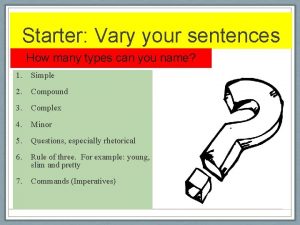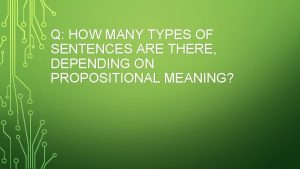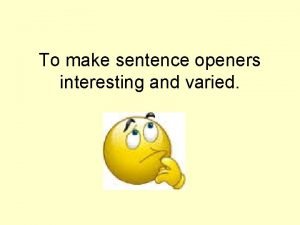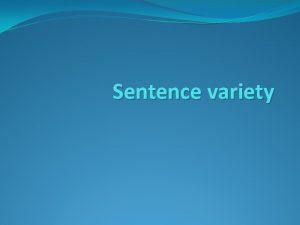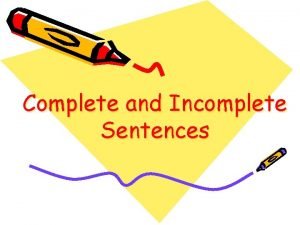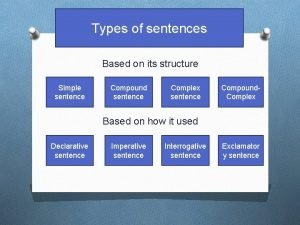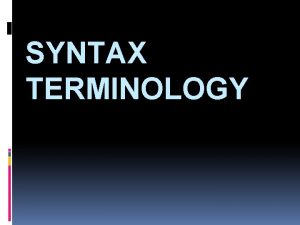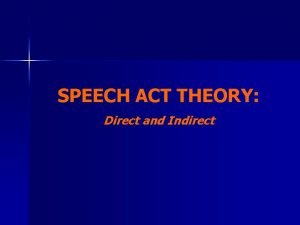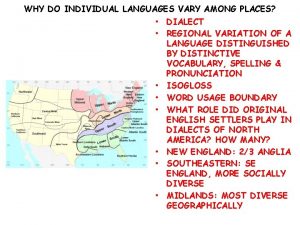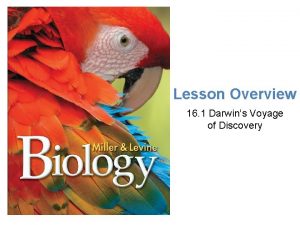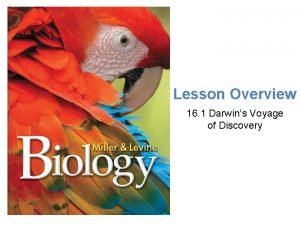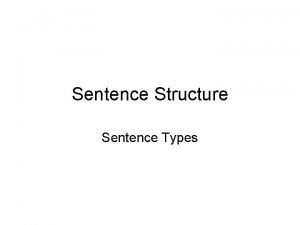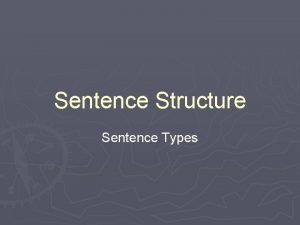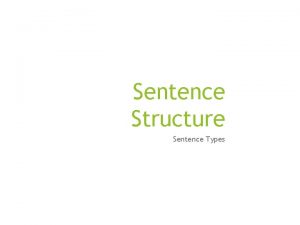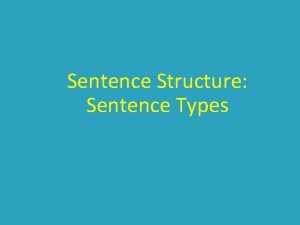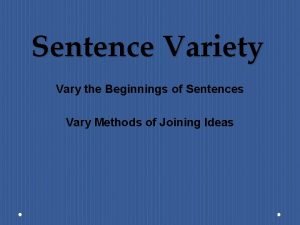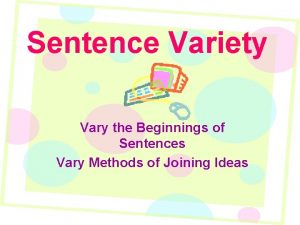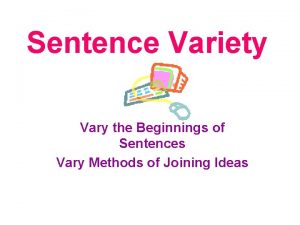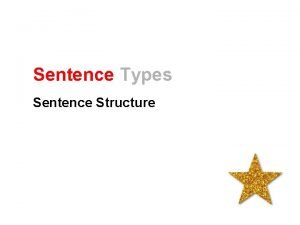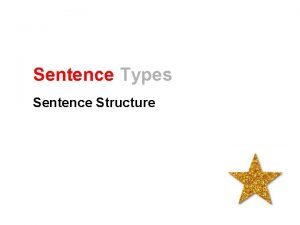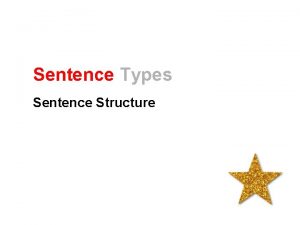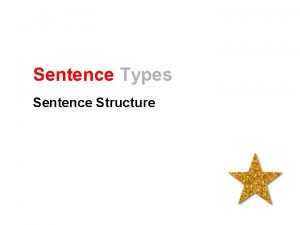Sentence Structure 4 Types of Sentences Vary your













- Slides: 13

Sentence Structure 4 Types of Sentences Vary your sentence structure

A Sentence. . . • MUST have a subject and a verb (predicate) • MUST have a complete thought Also. . . • Begins with a capital letter • Ends with punctuation

Phrases vs. Clauses Before we can identify the different types of sentence structure, we must know the difference between a PHRASE and a CLAUSE. Phrase: a group of words that operate as one unit; a phrase has a noun or a verb, but NEVER both Ex: prepositional phrase, verb phrase Clause: a group of words that contains BOTH a subject and a verb • Can be dependent (or subordinate) - means it cannot stand alone and must be connected to an independent clause to create a sentence • Can be independent - means it can stand alone as a sentence by itself; is a complete thought

4 Types of Sentence Structure Simple sentence = ONE independent clause May have a compound subject or compound verb, but still only one main clause and no dependent clauses; may have phrases included, but still only one independent, main clause Examples: Brian ran down the field. (1 subj and 1 verb) Hope and Kelsie talked and laughed all night. (compound subj and compound verb) In the past Sara has written some very good poetry. (1 subj and 1 verb)

4 Types of Sentence Structure Compound Sentence - = 2 or more independent clauses Can be joined by a coordinating conjunction (FANBOYS) and comma or by a semicolon Examples: Hannah likes to read, but she likes to watch movies, too. Hunter wants to play baseball, or he might go out for golf, but he will always play football. Ryan plays the trumpet well; he practices every day of the week.

Sentence Structure Practice: Identify these sentences as simple (S) or compound (CD). 1. Ella hoped to win the contest and get a prize. 2. Jonathan saw the opportunity, and he drew back the bow. 3. Jack and Dustin scored well on the test in their math classes. 4. Kim decided she did want to go on the trip, yet she still had to raise the money to go. 5. In the pasture behind our house, my horse loves to run and buck in the sunshine.

4 Types of Sentence Structure Complex Sentence = 1 independent clause and 1 or more dependent clauses Examples: When it started to snow, the children all cheered. I will grade all of the tests after I finish my lunch. Before he started playing in the band, Josh wondered what he would do with all of his spare time.

Sentence Structure practice: Identify these sentences as compound (CD) or complex (CX): 1. After we clean up this mess, we will go get something to eat. 2. Shelia bought a new dress for the dance, but she couldn't find new shoes to match. 3. Jose did not win the contest although he practiced for days. 4. When you finish your homework, you may go outside and play. 5. Colby fell down the stairs, so he was limping later.

4 Types of Sentence Structure Compound-Complex Sentences = at least 2 independent clauses (a CD sentence) and at least 1 dependent clause (to make it CX) Examples: When I realized I was wrong, I apologized, but I still felt bad about it. Katie wanted a new puppy, and she asked her mom after she had cleaned her room thoroughly. ***Compound/Complex sentences get you a higher score on the ADAW and other writing tests

Compound/Complex sentences: Here are some CD/CX sentences. Identify the independent clauses and dependent clauses in each. 1. Michael always dresses nicely for school, and he always looks stylish because he likes to be neat. 2. After she gets out of school, Olivia grabs a quick snack, and she heads straight to cheerleading practice. 3. When Tyler looks out his window, he sees the beautiful day waiting, and he longs to be outside playing.

4 Types Sentence Structure practice: Identify these sentences as simple (S), compound (CD), complex (CX) or compound/complex (CD/CX) 1. Billy did his book report, but he forgot and left it at home. 2. In the late afternoon sunshine, Paige looked beautiful on her horse. 3. Before you leave for work, you need to call your grandmother and say hello. 4. I think you should apologize to Mark before your problem gets even bigger. 5. Although Beth tried very hard, she could not hit the target, and she was very frustrated.

Sentence Structure practice continued. . . 6. Karli made a good grade on her test, so she got to go to the party. 7. Jacob and Coley waited and waited for the bus from the elementary school. 8. Julie screamed and shouted when she discovered the results of the election. 9. Makayla wanted to go shopping, but her mother was sick after she substituted at school. 10. Pate went hunting in the huge field, but he didn't see a deer all day.

4 Types of Sentence Structure Why? You can greatly improve your writing by using a variety of sentence structures. Your writing will "flow" better, will be much more interesting, and will sound more sophisticated. Try using a combination of all four kinds of sentence structures in your writing; the results are worth the effort.
 Vary your sentences
Vary your sentences How many types of sentences are there
How many types of sentences are there Vary sentence structure
Vary sentence structure Adverb sentence openers examples
Adverb sentence openers examples Vary sentence length example
Vary sentence length example Supporting sentence example
Supporting sentence example Complete and incomplete sentences
Complete and incomplete sentences Types of sentences based on structure
Types of sentences based on structure What is a sentence structure
What is a sentence structure Direct speech
Direct speech Give us your hungry your tired your poor
Give us your hungry your tired your poor How do individual use languages vary among places
How do individual use languages vary among places Species vary locally
Species vary locally Species vary locally
Species vary locally
